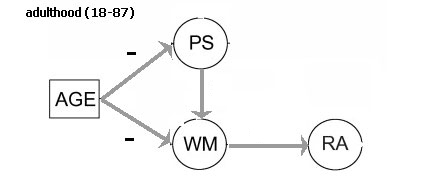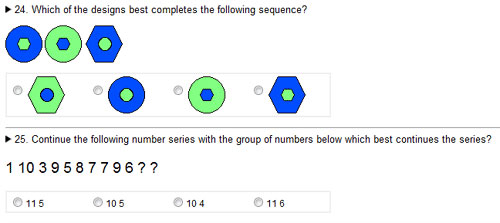The Scientists
Ted Nettlebeck and Nicholas Burns at the University ofAdelaide recently investigated what causes both the improvement of reasoning ability (fluid intelligence) in children between the ages of 8 to14 and the decline in reasoning ability in adults from 50 years onwards.
The Study
They took a large sample of children aged 8–14 years and adults aged 18–87. They all completed the same set of IQ tests, which measured their abilities in processing speed, working memory and reasoning ability. Even though each of these abilities is partly distinct, they are all positively linked with overall intelligence and IQ level.
1. Processing speed
This includes reaction time (how fast you can react to stimuli) and inspection time (how long it takes to identify a simple stimulus).
For example – the time it takes to say which of the vertical lines is longer, the left or the right?
How fast a person is on this simple task correlates with a person’s IQ level.
2. Working memory
This is a short term system for briefly storing and managing the information needed to carry out complex tasks such as problem solving, learning, reasoning, and comprehending language.
The training exercise used in our HighIQPro software is a very good measure of working memory. Other measures include ‘memory span’. In a typical test of memory span, a psychologist reads out a list of random numbers or words. At the end of a sequence, the person whose memory span is being measured is asked to recall the items in order. The average memory span for normal adults is 7 items, plus or minus 2. (You can try this with a friend to find your memory span).
Working memory capacity (how many items can be held in mind while doing a task) is correlated with IQ level.
3. Reasoning ability
Cluedo and Sudoku are good examples of games requiring reasoning ability – using logic and the process of elimination. Reasoning involves the use of logic. It involves reaching conclusions from premises in a way that is valid. It is at the core of fluid intelligence, our problem solving ability. A typical example of a test for reasoning ability in an IQ test is what is known as a Matrices test. Here’s an example from the Mensa workout:
These kinds of questions are direct measures of intelligence.
What did Nettlebeck and Nicholas Burns find?
They found that for children as they age from 14 to 18 years old, their processing speed increases. This increased speed improves their working memory, and their working memory improves their reasoning ability/fluid intelligence. This is shown in the diagram below. The plus sign indicates a positive association.
The links between processing speed, working memory and reasoning/fluid intelligence was different for adults however. They found that between the ages of 18 to 87, processing speed steadily declines. This is indicated by the ‘-‘ (minus) sign in the diagram below. Slower information processing reduces working memory capacity. They also found that from the age of 55 onwards working memory declines independently from processing speed.

This is partly due to the steady loss of brain cells that is known to occur in the memory brain structure called the hippocampus during aging. The overall reduction in working memory causes poorer reasoning skills in older age.
What was the magnitude of the decline?
The 55 plus group performed at 72% the level of the 18-45 year olds on working memory (memory span)
The 55 plus group performed at 75% the level of the 18-45 year old group in reasoning (matrices)
This kind of reduction in cognitive function is called ‘cognitive aging’. This study shows that the decline in fluid intelligence during aging is due to poorer working memory capacity.
It is worth noting that this decline sets in from our 30s onwards – but it is more pronounced in middle age and older.
What can we do to prevent cognitive decline?
The study clearly points at the following conclusion: preventing decline in reasoning ability and fluid intelligence depends on preventing a loss of working memory capacity. Therefore training working memory can have profound cognitive consequences as we age. HighIQPro is an effective brain training exercise for increasing working memory capacity, and therefore fluid intelligence and reasoning ability.
Reference




